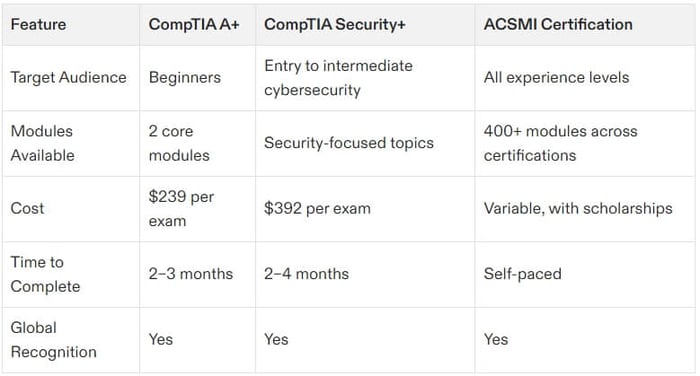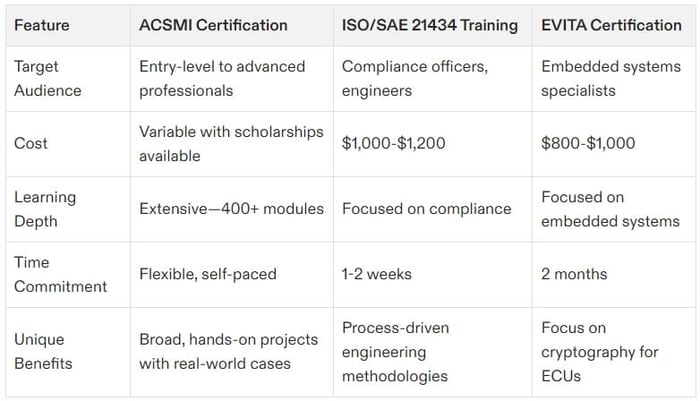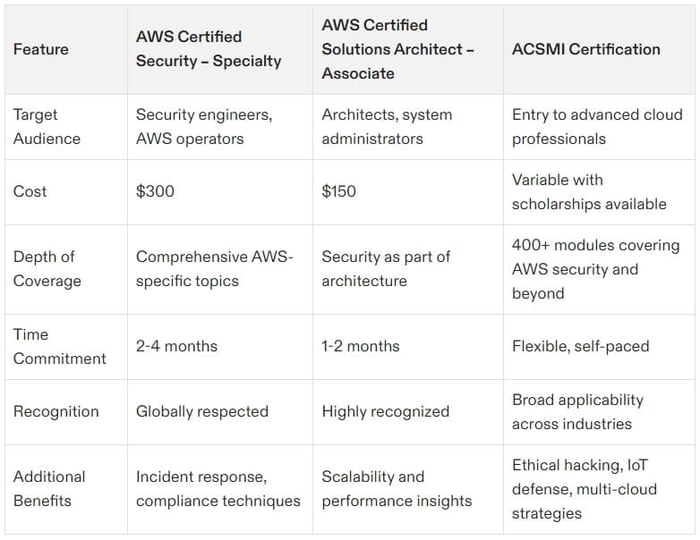Table of Contents
- Why Certifications Matter for Beginners in Cybersecurity
- Benefits of Following a Cybersecurity Certification Path for Beginners
- Structured Learning
- Credibility
- Hands-On Skills
- Job Market Advantage
- What Is the Cybersecurity Certification Path for Beginners?
- Step-by-Step Beginner Certification Path
- How to Choose the Right Certification Program
- ACSMI’s Cybersecurity Certification Path
- Less Known Facts about Cybersecurity Certification
- Final Thoughts
- Frequently Asked Questions (FAQs)
Cybersecurity has become one of the most critical fields in the tech industry today, and the demand for cybersecurity professionals continues to rise. As cyberattacks grow in both frequency and complexity, the need for skilled professionals to protect sensitive data and systems has never been greater. For beginners looking to enter this field, What Cybersecurity Certification Should I Get First is a common question, as a structured certification path is the most effective way to gain foundational skills, build credibility, and position yourself as a trusted cybersecurity professional.
Why Certifications Matter for Beginners in Cybersecurity
Cybersecurity certifications are an essential stepping stone for anyone starting out in the field. They help validate your knowledge and skills, providing employers with proof of your competence and commitment to the profession. Certifications are an excellent way to stand out in a competitive job market, as they demonstrate your readiness to handle the complexities of modern cybersecurity tasks. In addition, certifications can give you confidence as you begin your career, knowing that you have met industry standards.
Benefits of Following a Cybersecurity Certification Path for Beginners
Structured Learning
Certifications like CompTIA Security+ and ACSMI’s programs offer a well-organized, step-by-step approach to learning cybersecurity. These programs are designed specifically for beginners, meaning they start with basic concepts and gradually increase in complexity. This structure helps you build a solid foundation in cybersecurity, ensuring you understand the core principles before moving on to more advanced topics.
Credibility
Earning a recognized cybersecurity certification significantly boosts your credibility in the field. It serves as proof that you have acquired specific knowledge and skills, making you more trustworthy in the eyes of potential employers. With certification, you're seen as a serious professional committed to cybersecurity, which can make you stand out from candidates without formal qualifications.
Hands-On Skills
Many leading certifications focus not just on theory but also on practical, hands-on skills. For example, certifications often include simulations, labs, and real-world scenarios where you can apply what you’ve learned. This practical experience is essential because cybersecurity is a highly dynamic field, and real-world experience helps you adapt and respond effectively to security challenges.
Job Market Advantage
Having a cybersecurity certification gives you a significant advantage in the job market. It signals to employers that you're not only knowledgeable but also prepared to take on cybersecurity responsibilities right from day one. This readiness makes you a more competitive candidate compared to others who might lack certification or practical experience, making it easier to secure jobs and advance in your career.
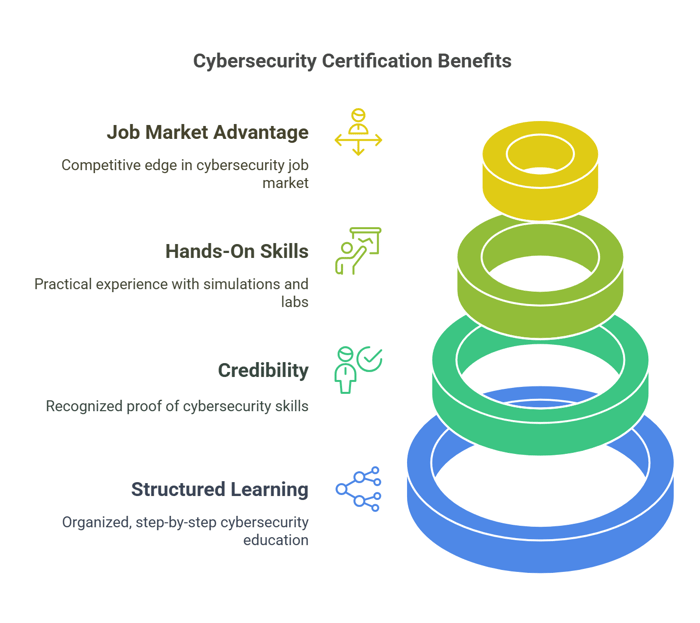
What Is the Cybersecurity Certification Path for Beginners?
The cybersecurity certification path for beginners is a series of certifications and courses that help you progressively build knowledge and skills in the field. These certifications prepare you for entry-level roles such as Security Analyst, Network Engineer, or Cybersecurity Specialist. How Much is Google Cybersecurity Certification is a common question among beginners looking to invest in their career. By following a structured path, beginners can gradually gain the expertise required for more specialized and advanced roles in the industry.
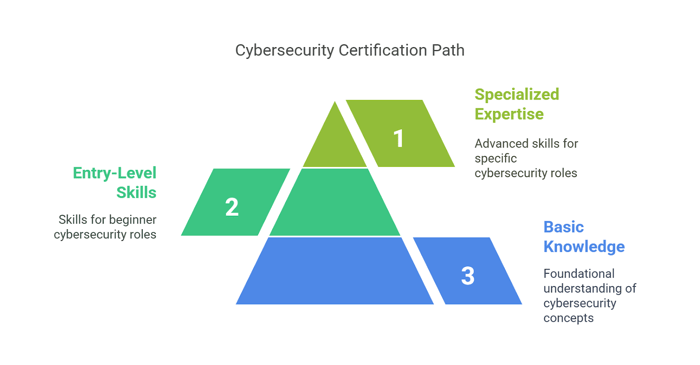
Step-by-Step Beginner Certification Path
Start with Basic IT Knowledge Before diving into cybersecurity, it's crucial to understand the fundamentals of information technology (IT). Knowledge of networks, systems, and data interactions will provide the foundation for more advanced cybersecurity concepts.
Certification to Consider: CompTIA IT Fundamentals (ITF+), which covers the basics of IT and digital systems.
Earn a General Cybersecurity Certification After you have a basic understanding of IT, it’s time to focus on general cybersecurity concepts. These certifications teach foundational principles such as risk management, threat assessment, and cybersecurity compliance.
Certifications to Start With: CompTIA Security+ is a widely-recognized entry-level certification that covers essential cybersecurity topics such as network security and cryptography.
ACSMI Beginner Modules also provide a comprehensive overview of foundational cybersecurity topics, perfect for beginners.
Specialize with Intermediate Certifications As you gain more experience, consider specializing in specific areas of cybersecurity, such as network security or ethical hacking. These certifications offer more in-depth knowledge and prepare you for technical roles.
Intermediate Certifications: Certified Ethical Hacker (CEH) focuses on identifying and fixing system vulnerabilities. Cisco Certified CyberOps Associate is ideal for those interested in security operations and monitoring.
Gain Practical Experience While certifications are essential, hands-on experience is just as important. Look for certifications that include practical labs and simulations to apply what you’ve learned.
Options for Beginners: ACSMI’s Certification Program offers real-world simulations and projects that help you build practical experience while working on actual cybersecurity challenges.
How to Choose the Right Certification Program
Selecting the right certification program is crucial for your success in cybersecurity. With many options available, it’s important to consider your career goals, budget, and learning preferences when choosing a program.
Define Your Career Objectives Start by clarifying your career goals. Are you aiming for a role in security operations, or would you prefer a broader cybersecurity knowledge base? Identifying your aspirations helps you select certifications that align with your career trajectory.
Research Provider Reputation The credibility of the provider plays a huge role in your certification’s value. Programs from well-known providers such as CompTIA, Cisco, and ACSMI are respected in the industry and can increase your job prospects.
Assess Cost and Scheduling Flexibility Cost is an important factor. While some programs may be more expensive, others offer cost-effective solutions. Online programs provide greater flexibility and allow you to study at your own pace, making them ideal for those with busy schedules.
Ensure Hands-On Learning Opportunities Cybersecurity is a practical field, so hands-on experience is crucial. Certifications that integrate simulations, labs, and real-world case studies provide immense value and give you a stronger skill set.
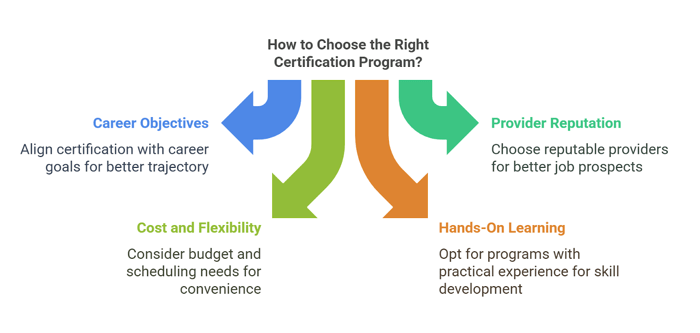
ACSMI’s Cybersecurity Certification Path
ACSMI offers a comprehensive certification path for beginners, designed to provide both theoretical knowledge and practical skills. Their programs are structured to help you progress from basic IT knowledge to advanced cybersecurity expertise, all while building a strong portfolio of hands-on projects.
Less Known Facts about Cybersecurity Certification
Certification Validity Period: Many certifications, including CompTIA Security+, require periodic renewal, typically every 3 years, to ensure that professionals stay updated on the latest security trends.
Hands-On Labs: Some beginner certifications, like ACSMI, include virtual labs, providing practical experience with real cybersecurity tools and environments.
Free Learning Resources: Some providers, such as CompTIA, offer free resources like study guides and practice exams to help candidates prepare for certification exams.
Industry Partnerships: Certifications from recognized providers often come with partnerships with top tech companies, helping professionals gain access to exclusive job opportunities.
Certifications Boost Salary Potential: Certified professionals often earn significantly higher salaries than their non-certified peers. Cybersecurity certifications can lead to an average salary increase of 10-20%.
Cybersecurity’s Global Demand: The need for certified cybersecurity professionals is not limited to one region but is growing worldwide. This makes certifications like CEH and CISSP valuable for those looking to work internationally.
Final Thoughts
Embarking on a cybersecurity certification path as a beginner can set the stage for a rewarding career. By following a structured certification path and selecting reputable programs like ACSMICertification, you can acquire the necessary skills and experience to succeed in the cybersecurity industry. With growing demand for cybersecurity professionals, certifications are a key asset in securing job opportunities and advancing your career.
Frequently Asked Questions (FAQs)
What is the best beginner-friendly certification for cybersecurity?
CompTIA Security+ and ACSMI beginner modules are excellent starting points for those new to cybersecurity. These certifications cover fundamental cybersecurity concepts and provide a strong foundation.
How long does it take to complete a certification program?
Entry-level certifications like Security+ can take between 6 to 12 weeks to complete, while more advanced programs like CEH might take 3 to 6 months.
Are online programs credible for beginners?
Yes, online programs from reputable providers like ACSMI and CompTIA are widely respected in the cybersecurity industry and trusted by employers.
What is the cost of completing a cybersecurity certification path?
The cost varies depending on the provider and program. Beginner certifications typically range from $300 to $600, while more specialized certifications may cost more.
Can I pursue cybersecurity certifications without prior IT experience?
Yes, many certifications, such as CompTIA ITF+ and ACSMI beginner modules, are designed for individuals with no prior IT or cybersecurity experience, making them perfect for beginners.



